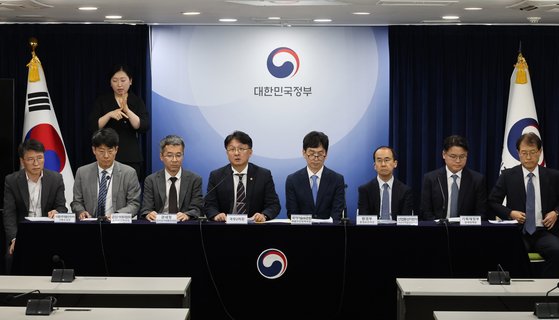
국무조정실 이정원 국무 2차장이 19일 서울 종로구 정부서울청사에서 해외직구 관련 추가 브리핑을 하고 있다. 연합뉴스
‘국민의힘과 정부, 대통령실이 19일 오후 고위 당정협의회를 열어 해외직구 관련 정책 혼선, 채상병 특검법 대응, 의과대학 증원 등 주요 현안을 논의했다.’
‘According to multiple government officials, during the meeting on that day, the leadership of the ruling party, the government, and the presidential office received detailed explanations from the government about the announcement and subsequent withdrawal process of the policy regulating overseas direct purchases of products that have not received local safety certification (KC). The government practically announced the withdrawal of the regulation on the same day it revealed the policy, amid criticisms like ‘flip-flopping policy.’ The meeting also discussed follow-up measures regarding overall online commerce regulations and public opinion responses. An official from the ruling party said, “It was a moment for the government to explain the failure to thoroughly consider public interests before implementing the policy.”
‘Earlier, when the government announced the prohibition of overseas direct purchase of some KC-unapproved products on the 16th, criticisms against the policy emerged not only from opposition parties but also from within the ruling party, labeling it as ‘excessive regulation’ (former supreme council member Han Dong-hoon), ‘ignorant policy’ (former lawmaker Yoo Seung-min), and ‘hastily implemented policy without checking for side effects’ (former floor leader Na Kyung-won).’
‘The ruling party and the government also exchanged views on responding to the opposition’s demand for a re-examination of the ‘Chae Sang-bum Special Prosecutor Act.’ They reached a consensus to monitor the ongoing investigations into the Chae Sang-bum case by the police and the Public Procurement Service, and to propose to President Yoon Suk-yeol the exercise of the right to reject the demand for a re-examination in the upcoming cabinet meeting on the 21st. President Yoon had expressed his stance of ‘prosecution first, then special investigation’ during a press conference marking his second anniversary since inauguration on the 9th.’
‘The ruling party anticipates that even if the Democratic Party of Korea proceeds with the reconsideration process at the plenary session of the National Assembly on the 28th, there is a high possibility of rejection. For the reconsideration of the Special Prosecutor Act, the presence of a majority of attending members and the approval of two-thirds of the attending members are required. If all 296 members are present, 198 affirmative votes are needed, and mathematically, according to the calculations of the ruling party, if there are more than 18 defections among the 113 members of the ruling party, it can be possible to reject the bill. Some in the Democratic Party also predict that it will be difficult to pass the bill in the 21st National Assembly.’
‘However, the fact that the vote is conducted anonymously and the low attendance of opposition members may lower the threshold for the approval vote, making it possible to pass with relatively few defections. A ruling party official stated, “Since the previous floor leader Yoon Jae-ok, efforts have been made to minimize defections” and mentioned that “most members of the 21st National Assembly from the party are expected to attend the plenary session.’
‘At the meeting held over dinner at the official residence of the Prime Minister in Samcheong-dong, various national agenda items were discussed, including the expansion of medical schools and a comprehensive response to the ‘lignite affair’ and the establishment of a low-birthrate department. A participant in the meeting said in a phone interview, “It was a meeting to exchange greetings with the new party leadership. There was a consensus to regularize further meetings and strengthen communication.” Those in attendance from the ruling party included Hwang Woo-yeo, Vice Chairman of the Emergency Measures Committee, Choe Gyeong-ho, floor leader, Jeong Jeom-sik, Chairman of the Policy Committee, Seong Il-jong, Secretary-General, and Bae Jun-young, Deputy Leader of the Floor. From the government side, Han Duck-soo, Prime Minister, and Pang Gi-seon, Chief Presidential Secretary, as well as from the President’s office, Jeong Jin-seok, Chief of Staff, and Seong Tae-yun, Director of Policy were present.’

